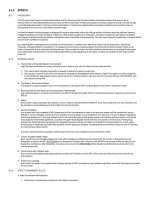THUYẾT TRÌNH Reported speech PPT
Bạn đang xem bản rút gọn của tài liệu. Xem và tải ngay bản đầy đủ của tài liệu tại đây (1.08 MB, 23 trang )
Lesson 2: reported
speech
Reported speech which tells you what
someone said, but does not use the
person's actual words.
2
Statements in present tenses or
simple future tense
Statements in simple past
Types of
reported speech
Command
Question
3
Statements in present tenses or simple future tense
* say to → tell : says to → tells
* Change the personal pronouns according to the meaning of the sentence: 1* → Subj: 2nd → Obj:
3rd > no change
* Omit ! (that)
* no changes in tenses + words showing place and time.
-Ann says, "I am sixteen." =>.Ann says that she is sixteen.
- They say to Tom, "You work for her today." =>They tell Tom (that) he works for her today.
exercises
1.
They say, "We are living with our children.”
They say they are living with their children.
2. He says to me. “I like your dress.“
He tells me that he likes my dress.
3. "I want to bring it home." he says.
He says he wants to bring it home.
4. She tells him, "I don't like your brother”.
She tells him she doesn’t like his brother.
5
Statements
(reporting verbs in simple past tense)
said to+ O → told + O
Change the adverbs
Direct speech
1.
Now
Reported speech
1. Then
2 . Today
2. That day
3. Tomorrow
3. The following day/ the next day
4. Yesterday
4. The day before/ the previous day
5. Next week/ month/ year…
5. The previous week/ month/ year
6. This/ that
6. These/ those
7. Here
7. There
Statements (Reporting verbs in simple past tense)
said to+ O → told + O
Change the tenses
Direct speech
1.
Simple present (is/ go)
Reported speech
1. Simple past (was, were/ went)
2 . Present continue (is doing)
2. Past comtunue (was,were doing)
3. Present perfect ( has done)
3. Past perfect: ( has done)
4. Simple past (went)
4. Past perfect ( gone)
5. Past continue (was doing)
5. Past perfect continue (had been doing)
6. Past perfect (had met)
6. Past perfect (had met)
7. Modal verds: will /can /shall
7. would /could /should
7
Direct speech
Simple Present: “I don’t know this man”
Reported speech
Simple Past: He said he didn’t know that man
Present Continuous: “I’m working for a foreign company”
Present Perfect: “I’ve read a good book”
Past Continuous: He said he was working for a foreign company
Present Perfect Continuous: “I have been writing my report”.
Past Perfect: He said he had read a good book
Simple Past: “I finished my assignment”
Past Perfect Continuous: He said he had been writing his report
Simple Future: “I will do it later”
Past Perfect: He said he had finished his assignment
Modal Verbs:
Future in the past: He said he would do it later.
“I can work late today”
Past forms of modals:
“I may see her tonight”
He said he could work late that day
“I must/have to go now”
He said he might see her that night
He said he had to go then
8
Note:
In the direet speech expresses a general truth, the
tense of the verb can remain, unchanged in the
reported speech
- The teacher said. "The earth revolves around the sun."
=> The teacher said the earth revolves around the sun.
9
COMMAND
Affirmative command
Ex1: Mai said to Lan
Told
“Chose the windows, please”.
⇒
Mai told Lan to chose
the windows.
Ex2: He said to his brother
S
+ Ordered + to Vo
Asked
………..
“Go away now”.
⇒
He told his brother to
go away then.
10
command
Negative command
Told
S
Ex 1 : They said,
“Don’t sit here, Nam”.
=> They ordered Nam not to sit.
+ Ordered + not to Vo
Asked
………..
Ex 2 : Parents told their children “Don’t touch the socket”.
=> Parents told their children not to touch the socket.
11
1. Minh told Lan, "Don't cry any more."
Minh told Lan not to cry any more.
………………………………………………
2. The teacher said, "Come to my office, John!"
The teacher told John to come to his/her office.
…………………………………………………….
3. The dentist said to me, “Look at me, please!”
The dentist told me to look at him.
.................................................................................
4. Don't get off the bus while it's going.", the driver said.
The driver told us not to get off the bus while it was going.
……………………………………………………….....
5. Mary said to me, "Don't give him your address if he asks you.”
Mary told me not to give him your address if he asks you.
…………………………………………………………….
6. MR. Green said, “Please come to our dinner tonight, Bill”
Mr.Green told Bill to come their dinner tonight, Bill.
………………………………………………………….
12
a) Wh - Questions
QUESTIONS
b)Yes/No Questions
13
S + asked + O
what/when/where/who/how…+
S+ V
If
S+V
(Whether
S+V or not)
14
a/ Wh-Questions:
1. Lan said to me, “Who is he?”
=> Lan asked me who he was.
2. Bill asked Ann, “How are you living now?”
=> Bill asked Ann how she was living then.
15
b/Yes/No Questions:
1. I asked him, “Did you break this glass?"
=> I asked him if he had broken that glass.
2. He asked me, "Have you met Lan?"
=> He asked me whether I had met Lan or not.
16
S + asked + O
what/when/where/who/how…+
S+ V
If
S+V
(Whether
S+V or not)
17
Wh - Questions
Direct question
Reported question
1.
1. He said: “When will they come?”
2. He said: “Who was seen Avatar?”
3. He said: “How much might it cost?”
=>
2. =>
3. =>
18
Yes/No Questions
Direct question
Reported question
1. =>
1. I said: “Can I help you?”
2. =>
2. She said to us: “Did you feel cold?”
3. He said: “Are your hands cold?”
3. =>
19
SPECIAL NOTES ON REPORTED SPEECH
20
a. Exclamations are introduced by verbs like EXCLAIM, GREET, REMARK, CRY OUT,
SIGH, COMPLAIN... in reported speech, according to the meaning of the exclamations.
1. "My goodness, what a lovely dress!"
=> She exclaimed that the dress was lovely (was a lovely one).
2. "Hello! Where are you going?"
=> He greeted me and asked (me) where I was going.
21
b. If the direct speech consists of a number of short sentences, these sentences can be
joined together in reported speech.
1. "How old are you now? Can you read yet?"
=> I asked the child how old she was and if she could read yet.
2. "What time is it? My watch has stopped."
=> I asked him what time it was, as my watch had stopped.
22









